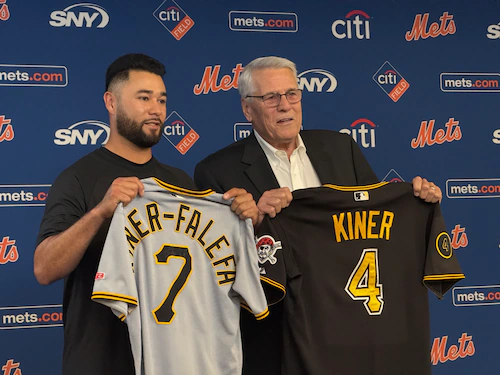Tickets meant to provide underprivileged or at-risk children access to Pittsburgh Penguins, Pirates games, and other events were instead misappropriated by individuals exploiting a charitable program, according to a grand jury investigation.
Rather than reaching the intended recipients, the tickets were diverted by individuals who manipulated a nonprofit organization’s mission to benefit vulnerable children.
On Thursday, Pennsylvania State Police filed charges against six individuals based in Pittsburgh, North Versailles, and Johnstown, along with two organizations. They were accused of conspiring to acquire complimentary tickets and then either distributing them among their own acquaintances or selling them to ticket scalpers.
The grand jury identified Tickets for Kids, a Pittsburgh nonprofit, as the entity targeted in the scheme. The fraud reportedly spanned several years and included thousands of tickets valued at hundreds of thousands of dollars.
The presentment claims the suspects used their own nonprofit organizations to acquire free tickets from Tickets for Kids, only to reroute them for unauthorized use.
The individuals charged include Todd Anthony Hall (55), Ramona Wilkes (63), Kevin Riley (59), and Jacob Mazzie (26), all of Pittsburgh; Mary Henning (64) from North Versailles; Quan Britt (48) of Johnstown; and two organizations—Steel City Tickets, also known as AAA Primetime Tickets, located in Green Tree, and Hope 4 Johnstown.
All face charges including participating in corrupt organizations, deception-related theft, receiving stolen property, misuse of communication systems, and conspiracy. Additional charges were filed: Britt, Mazzie, and Henning are also accused of processing illegal profits and engaging in fraudulent business practices. Riley is accused of dealing in illegal proceeds, while Wilkes and Hall face allegations of deceptive or fraudulent operations.
Henning’s lawyer, Ralph Karsh, declined to comment on the charges. Attempts to contact attorneys for the other defendants were unsuccessful as of Friday, as were inquiries to the involved nonprofit groups.
Britt, who serves as executive director of Hope 4 Johnstown, is said to have obtained 536 complimentary tickets worth $16,711 between June and November through fraudulent means. In most cases, he named himself or another individual as the attending chaperone, according to the grand jury.
Tickets for Kids Executive Director Brandice Miller issued a statement to TribLive on Friday, acknowledging the lapse in preventive systems.
“Although we’ve maintained strict safeguards to prevent this kind of abuse, these individuals managed to bypass our controls,” Miller said. “We’ve now introduced enhanced protections to ensure our mission is upheld and that all children receive the experiences they deserve.”
‘Concerning patterns’
Tickets for Kids requires nonprofits to submit an application, confirm tax-exempt status, and prove that at least 70% of their clientele consists of low-income or at-risk youth. Once approved, organizations assign a representative to request and receive tickets. The program’s rules specify that tickets are solely for children and their chaperones and cannot be sold or transferred.
The designated representatives are responsible for selecting events and submitting post-event reports. The grand jury alleged that, in the fraudulent cases, the representative often listed themselves as chaperones and submitted falsified follow-up reports.
The investigation began when Miller received a tip from an individual who claimed he had been offered money to use his nonprofit’s credentials to secure free tickets for resale.
The informant was reportedly promised payment for signing up his organization with Tickets for Kids to obtain tickets, which would then be sold at a profit. Miller subsequently analyzed the nonprofit’s internal systems and detected troubling trends.
She reported the issue to state police, who carried out several months of investigation, including covert ticket purchases.
Tickets for Kids has operations in Pittsburgh, Minneapolis, New York, and Washington, D.C. Since its founding, the group has distributed over 3.6 million tickets valued at more than $83 million for events covering sports, culture, entertainment, STEM education, and the arts.
Undercover buy
Text messages examined by the grand jury revealed that Britt’s co-conspirator resold many of the tickets to Mazzie, who then profited by reselling them.
Mazzie and Steel City Tickets acted as unauthorized ticket brokers, securing the tickets under false pretenses and reselling them, the grand jury said.
Trooper Eric Guido of the state police conducted two undercover transactions involving tickets issued by Tickets for Kids.
On September 10, Guido paid $60 for four tickets from Mazzie. According to the report, the exchange took place near PNC Park, and Mazzie handed over a business card for “Prime Time Tickets,” complete with his contact number for future purchases.
The following day, Guido bought 10 Pirates game tickets from Mazzie for $200. Each ticket in both transactions matched those issued by Tickets for Kids.
Pitt, WVU football games
Mary Henning, CFO of the Center for Family Excellence in Pittsburgh’s Hill District, was another alleged participant.
She reportedly collaborated with Kevin Riley, a known scalper, to resell the tickets. Henning testified that for years, she had allowed relatives to use tickets intended for at-risk youth, often naming her daughter as a chaperone.
Between 2013 and 2024, her daughter appeared as a chaperone 18 times. In 2019, Riley approached Henning at the PNC Park will-call window to propose reselling tickets. Though she initially declined, she later contacted him and agreed to participate.
The arrangement allowed Henning to obtain tickets for numerous events, including Pirates, West Virginia University, University of Pittsburgh, and Penguins games.
Riley was listed as a chaperone for 366 tickets worth $8,746, while Henning herself was recorded as the chaperone for 7,235 tickets with an estimated value of $207,844.
On October 24, Guido purchased two tickets from Riley for $60 during another undercover buy.
Misuse by Pittsburgh Mercy employees
The investigation also implicated Pittsburgh Mercy, a nonprofit whose employees, Ramona Wilkes and Todd Hall, allegedly obtained large quantities of tickets for personal and unauthorized use.
Testimony stated that Wilkes and Hall routinely ordered blocks of 50 tickets and divided them between themselves for use by colleagues, friends, and relatives, despite the program’s intended purpose.
Wilkes admitted she was aware the tickets were meant for the children served by Pittsburgh Mercy, which, according to the grand jury, only had programming for about 20 children at the time.



